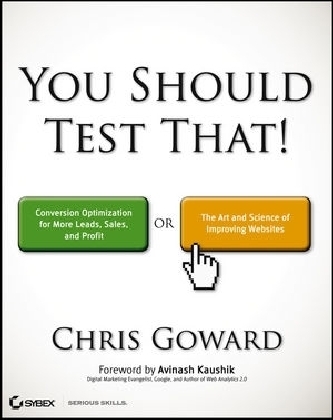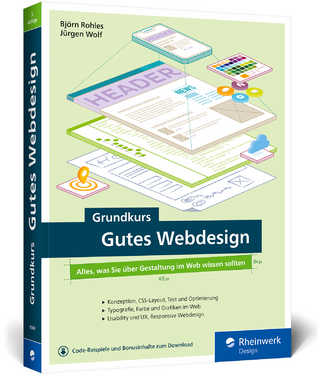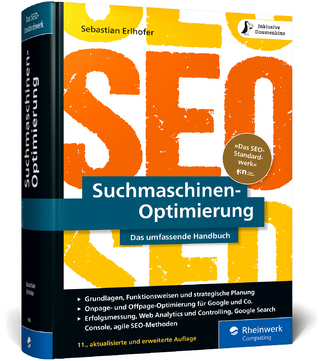
You Should Test That
Sybex Inc.,U.S. (Verlag)
978-1-118-30130-2 (ISBN)
Learn how to convert website visitors into customers
Part science and part art, conversion optimization is designed to turn visitors into customers. Carefully developed testing procedures are necessary to help you fine-tune images, headlines, navigation, colors, buttons, and every other element, creating a website that encourages visitors to take the action you seek. This book guides you through creating an optimization strategy that supports your business goals, using appropriate analytics tools, generating quality testing ideas, running online experiments, and making the adjustments that work.
Conversion optimization is part science and part art; this guide provides step-by-step guidance to help you optimize your website for maximum conversion rates
Explains how to analyze data, prioritize experiment opportunities, and choose the right testing methods
Helps you learn what to adjust, how to do it, and how to analyze the results
Features hands-on exercises, case studies, and a full-color insert reinforcing key tactics
Author has used these techniques to assist Fortune 500 clients
You Should Test That explains both the "why" and the "how" of conversion optimization, helping you maximize the value of your website.
Chris Goward is founder and CEO of WiderFunnel, the conversion optimization agency that has improved marketing results by up to 400% for such firms as eBay, Google, BabyAge.com, SAP, Electronic Arts, Iron Mountain, Expensify, Hair Club, and many more. Chris is recognized as a conversion optimization thought leader, has an influential blog (WiderFunnel.com/blog), and speaks internationally at such conferences as Search Engine Strategies, Pubcon, eMetrics, Search Marketing Expo, European Conversion Summit, IIMA, Conversion Conference, and Internet Marketing Conference.
Foreword xxiii
Introduction xv
Chapter 1 Why You Should Test That 1
Your Website Is Crucial to Your Business 2
Your Website Is Underperforming 4
All Websites Can Be Improved 4
The Halo Effect of Underperformance 5
Web Design for Results (Rather than Aesthetics) 9
Why “Best Practices” Aren’t Best 10
Is There a HiPPO in the Room? 11
The Risks and Costs of Website Redesign 12
Your New Website Design Could Hurt Your Results 13
Your Improvements May Be Overshadowed by Mistakes 13
Use Evolutionary Site Redesign 15
Conversion-Rate Optimization Increases Revenue without Increasing Advertising Spend 15
Comparing Conversion-Rate Optimization with Paid-Search Optimization 15
Conversion-Rate Optimization and Your Business 17
Conversion-Rate Optimization Results by Industry 17
Calculate the Benefit of Conversion-Rate Optimization 18
CRO Works alongside SEO 20
SEO and CRO Can Play Well Together 20
How to Do CRO without Hurting Your SEO 21
You Should Test That! 22
Chapter 2 What is Conversion Optimization? 23
Conversion Optimization Requires Controlled Testing 23
The Scientific Method of Controlled Testing 24
Selecting a Sample (Not a Free One, a Statistical One) 25
Using a Tool Designed for Controlled Testing 26
“Best Practices” Are Not Conversion Optimization 27
The Before & After Method Is Not Conversion Optimization 29
External Factors Mess with Your Data 30
Usability Testing Is Not Conversion Optimization 33
Surveys Are Not Conversion Optimization 37
Click Heatmap Tracking Is Not Conversion Optimization 38
What Is Conversion Optimization? 39
Who Are Your Target Audiences? 39
Target Markets and Personas 40
Setting Goals 41
Define Your Goals 42
The Goals Waterfall 42
Prioritize Your Goals 42
Should You Optimize for Micro-Conversions? 46
Web Analytics Goals vs Conversion-Optimization Goals 48
The Continuous Improvement Cycle 54
Continuous Improvement Is Key to Success 55
Progress from Macro to Micro 58
Chapter 3 Prioritize Testing Opportunities 61
Use Data to Prioritize Tests 62
Your Web Analytics Data 62
Your Home Page Isn’t Your Front Door 62
View Data at the Page-Template Level 63
The PIE Prioritization Framework 66
Prioritize Pages with High Potential for Improvement 67
Top Exit Pages 67
Analyze Your Conversion Funnel 70
Gather Qualitative Data 72
Prioritize Important Pages 82
Pages with High Traffic Volume Are More Important 83
Pages with Expensive Visits Are More Important 85
Prioritize Easy Test Pages 89
Consider Technical Implementation 89
Consider Organizational Barriers 94
Prioritize with a Weighting Table 94
Reprioritize Regularly 95
Chapter 4 Create Hypotheses with the LIFT Model 97
Methodology Is More Valuable than Tips 98
The Gorilla in Our Brains 100
The LIFT Model 102
The Value Proposition 103
Relevance 104
Clarity 104
Anxiety 105
Distraction 106
Urgency 107
Problems Are Opportunities! 107
Fill the Marble Jar 107
Create Valid Hypotheses 109
The Hypothesis Structure 110
Good to Great Hypotheses 111
Tips to Get Your Testing Started 112
Chapter 5 Optimize Your Value Proposition 113
The Value-Proposition Equation 114
Your Visitor’s Perception Filters 115
Tangible Features 118
Product or Service Features 118
Incentives and Offers 119
Intangible Benefits 123
Credibility 123
Social Proof 128
Personal Benefits vs Business Benefits 136
Costs 137
The Price 137
Delivery Cost 141
The Incredible Power of Free 141
Associated Costs 143
What Is Your Value Proposition? 144
Test Your Value Proposition 145
Chapter 6 Optimize for Relevance 147
Marketing Funnel Relevance 148
Source Relevance 150
Relevance to Ad Messages 151
Relevance to Search Keywords 152
Relevance to Emails 158
Three Ways to Create Landing-Page Source Relevance 159
Target Audience Relevance 160
Customer Segmentation 160
Call-to-Action Relevance 162
Tone Relevance 163
Navigation Relevance 167
Competitive Relevance 174
Chapter 7 Optimize for Clarity 177
Information Hierarchy Clarity 178
Website-Level Information Hierarchy 178
Page-Level Information Hierarchy 181
Design Clarity 182
Eyeflow Clarity 182
Image Clarity 186
Color Clarity 191
Call-to-Action Clarity 193
Copywriting Clarity 195
Chapter 8 Optimize for Anxiety 207
Privacy Anxiety 208
Usability Anxiety 215
Form Usability 215
Website Errors 217
Site Speed 218
Effort Anxiety 219
Fulfillment Anxiety 223
Security 224
Fine Print 224
Brand Reputation 225
Delivery Promise 225
Guarantees, Returns, and Unsubscription 226
Turn Anxiety in Your Favor 228
Chapter 9 Optimize for Distraction 231
Two Distraction Points 232
First-Impression Distraction 233
Look through Your Prospects’ Eyes 233
Too Much Content 235
Daunting Text 237
Complex Graphics 238
Large Headers 238
Redundancy 240
Message Distraction 244
Too Many Messages 245
Irrelevant Content 245
Too Many Options 247
Navigation Bars 248
Image Distraction 248
Chapter 10 Optimize for Urgency 255
Internal Urgency 256
Seasonality’s Effect on Urgency 256
Create Internal Urgency 262
External Urgency 266
The Offer’s Effect on Urgency 267
Create Offer Urgency 268
Respond with Urgency 271
Chapter 11 Test Your Hypotheses 273
Set Test Goals 274
Types of Goals 274
Use Clickthroughs with Caution 276
Goal Triggers 277
The One-Goal Goal 279
Multi-Goal Tracking 280
Choose the Test Area 281
Templated Pages 282
Individual Static Test Pages 283
Individual Pages with Dynamic Content 283
Site-Wide Section Tests 283
Choose the Test Type 288
Consider Traffic Volume 288
Multivariate Testing 288
A/B/n Testing 290
My Recommendation: Emphasize A/B/n Testing 291
Alternative Path Tests 293
Isolate for Insights 293
How to Get Good Great Results 295
Test Boldly 295
Test Fewer Variations 296
Avoid Committee Testing 296
Win with Confidence 296
Maintain Your Control 297
Use Testing Expertise 297
Chapter 12 Analyze Your Test Results 299
Reading the Tea Leaves 300
Monitoring Your Tests 301
Wait for Statistical Significance 301
Remove Under-Performers 302
Don’t Give Up Too Early 302
Evaluating Results 303
How Accurate Are Your Results? 303
Multiple Goals 306
Revenue Results 306
Compare Isolations 310
What to Test Next? 311
Re-Prioritize Your Priorities 311
Beat the Dreaded Inconclusive Test 311
Chapter 13 Strategic Marketing Optimization 313
Aim for Marketing Insights 314
The Optimization Manifesto 314
Be a Marketing Optimization Champion 315
Index 319
| Verlagsort | New York |
|---|---|
| Sprache | englisch |
| Maße | 188 x 234 mm |
| Gewicht | 522 g |
| Themenwelt | Mathematik / Informatik ► Informatik ► Theorie / Studium |
| Informatik ► Web / Internet ► Web Design / Usability | |
| ISBN-10 | 1-118-30130-7 / 1118301307 |
| ISBN-13 | 978-1-118-30130-2 / 9781118301302 |
| Zustand | Neuware |
| Informationen gemäß Produktsicherheitsverordnung (GPSR) | |
| Haben Sie eine Frage zum Produkt? |
aus dem Bereich


